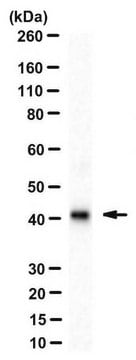MABC631
Anti-KLF4 Antibody, clone 1E6
ascites fluid, clone 1E06, from mouse
Synonym(s):
Krueppel-like factor 4, Epithelial zinc finger protein EZF, Gut-enriched krueppel-like factor
About This Item
Recommended Products
biological source
mouse
Quality Level
antibody form
ascites fluid
antibody product type
primary antibodies
clone
1E06, monoclonal
species reactivity
human
technique(s)
immunohistochemistry: suitable
western blot: suitable
isotype
IgG1
NCBI accession no.
UniProt accession no.
shipped in
wet ice
target post-translational modification
unmodified
Gene Information
human ... KLF4(9314)
General description
Immunogen
Application
Western Blotting Analysis: A 1:3,000 dilution from a representative lot detected KLF4 in transfected HEK293 cell lysates.
Optimal working dilutions must be determined by end user.
Apoptosis & Cancer
Apoptosis - Additional
Quality
Immunohistochemistry Analysis: A 1:200-1,000 dilution from a representative lot detected KLF4 in human lung cancer and colon tissues.
Optimal working dilutions must be determined by end user.
Target description
Physical form
Storage and Stability
Handling Recommendations: Upon receipt and prior to removing the cap, centrifuge the vial and gently mix the solution. Aliquot into microcentrifuge tubes and store at -20°C. Avoid repeated freeze/thaw cycles, which may damage IgG and affect product performance.
Analysis Note
Human lung cancer and colon tissues
Disclaimer
Not finding the right product?
Try our Product Selector Tool.
Storage Class Code
12 - Non Combustible Liquids
WGK
nwg
Flash Point(F)
Not applicable
Flash Point(C)
Not applicable
Certificates of Analysis (COA)
Search for Certificates of Analysis (COA) by entering the products Lot/Batch Number. Lot and Batch Numbers can be found on a product’s label following the words ‘Lot’ or ‘Batch’.
Already Own This Product?
Find documentation for the products that you have recently purchased in the Document Library.
Our team of scientists has experience in all areas of research including Life Science, Material Science, Chemical Synthesis, Chromatography, Analytical and many others.
Contact Technical Service






![Poly[(R)-3-hydroxybutyric acid] natural origin](/deepweb/assets/sigmaaldrich/product/structures/129/476/7d1c924b-f644-4889-a2d6-d7a923ce382c/640/7d1c924b-f644-4889-a2d6-d7a923ce382c.png)